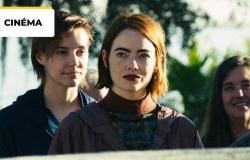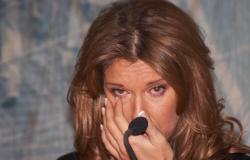“In the beating of the blades. Dann batten d’lame”, by Vincent Constantin, translated from Reunion Creole by the author, bilingual edition, Le Panseur, 280 p., €18, digital €10.
Wherever they live, the characters of Victor Constantin’s first novel are surrounded. By the steep and chaotic relief of the Mafate cirque as well as by the waves of the beaches of Saint-Paul, in Reunion. “Miss my monk’s hut, in the beating of the blade, in the land of the white sword and the dirty breeze”/ “I live with my mother, near the clapper of the waves, in a land of white sand and salty breezes”, says Irina, before her mother throws her out when she discovers she is pregnant at 12 years old. She moved to her father’s house, in the upper part of the island, where she gave birth alone to a son, Herivelo.
In the beating of blades sweeps away hope with the efficiency of a cyclone. The isolation of the Mafate cirque – where supplies are provided by helicopter – oppresses these victims of family violence, recounted through three perspectives, like three passes leading to the bottom of the same ravine: that of Irina, driven mad by her banishment; that of his son, Herivelo, raped by his mother at the age of 6; that of Ikala, Herivelo’s little neighbor, who tries to protect her mother from her father’s blows.
To express helplessness and control, Vincent Constantin stays as close as possible to his characters and their beliefs. Born in 1980 in Reunion Island, he first wrote in French, before switching to Creole in 2011, inventing a phonological spelling accessible to as many people as possible. Sliding from the left page (in Creole) to the right page (in French), our eye trains itself to grasp the workings of Reunion Creole, which tells the story of the settlement of the island. We hear the Gallo and Norman of the French settlers, the Malagasy, Indo-Portuguese and Tamil of the Indian workers who arrived in the 19th century.e century, the words of sailors and slave traders. Reunion Creole is a language of relief.
Dark daily
In In the beating of blades, the days are punctuated by prayer. The psalm of David echoes the dark daily life: “My God, I call all day long and you don’t answer; even at night I have no rest”, recites little Herivelo. Hindu cosmogony and the Bible are superimposed on the relief of reality, blurring it a little more (“Mom says we are like God and the Virgin: I am her dad, her man and her son, she is my daughter, my wife and my mom”relates Herivelo).
The children see the adults’ eyes as knives, the face of the incestuous mother above the pot is that of a witch watching over her cauldron. They scream ” It is not normal ! », those who could help them look at their feet. After the death of her mother, Ikala places a Virgin against the door of her house so that she does not come back to haunt them.. In this novel, children learn to survive.







